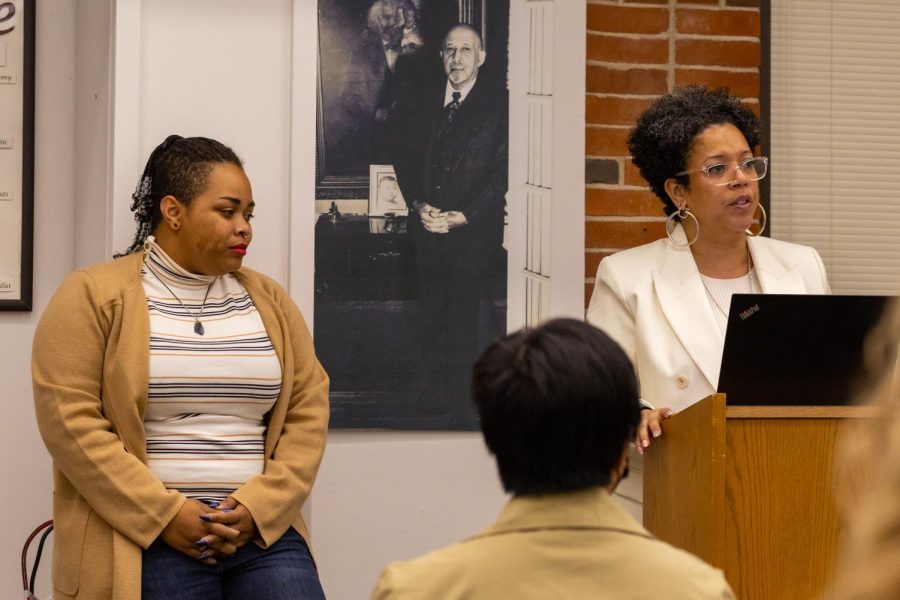On Thursday, Feb. 16, Dr. K. Bailey Thomas presented their lecture, “The Transubstantiation of Poor Whites and How W.E.B. Du Bois Predicted Trumpism,” at the University of Massachusetts W.E.B. Du Bois Center.
According to Thomas, a postdoctoral fellow at the W.E.B. Du Bois Center, the rise of Trumpism was not a “fantastical” turn of events. Instead, Thomas describes Trumpism as the breaking point of patterns throughout history, which W.E.B. Du Bois discusses in his 1935 book “Black Reconstruction.”
In the text, the sociologist counters other historians’ interpretations of Reconstruction with his own, arguing that Black Americans played a positive role in the rebuilding of a divided country. Thomas referred to the text as Du Bois’ “magnum opus.”
“We can actually see that Du Bois is creating a blueprint for how it is that the current white supremacist state was able to root itself in not just the public imaginary, but also in the everyday lives of American citizens,” Thomas said.
They began the lecture with pictures of Donald Trump and William Dunning sharing the same screen. A prominent political scientist in the late 1800s and early 1900s, Dunning led the “Dunning School” at Columbia University, which was “a safe haven for Southern students who were doing doctoral research on Reconstruction,” according to Thomas.
Despite Dunning emerging as a megaphone for Southerners’ interpretations of Reconstruction, Thomas said Dunning was from New Jersey.
“In a very similar way that we see Trump emerge as this demagogue, we also see a very similar emergence and status of William Dunning,” Thomas said. Referring to the immense wealth of Trump compared to those that supported him, and Dunning not being a Southerner like his followers, Thomas noted, “Neither of them have the background or understanding of the people that are following them.”
Along with the disconnect between the identities of the two leaders and their followers, both Trump and Dunning cleared a platform for the “white supremacist imagination.”
“Those who are becoming active in this alt-right group, or its various subgroups, now have always existed,” Thomas said. “Trump just essentially gave a platform and made it acceptable to be vocal and open about it.”
“A similar framework [was] being created under Dunning who, along with his students, helped shape the social imagination and the ways that we are even currently understanding the Civil War and the afterlife of slavery.” Publications like Dunning’s ‘Essays on the Civil War and Reconstruction and Related Topics,’ controlled the narrative of Reconstruction in favor of white supremacist groups.
Chanel Prince, a PhD student in the UMass sociology department attended the talk. She was struck by Dunning and Trump being unrepresentative leaders of their supporters and “the white supremacy holding them together like glue.”
Thomas claimed that historical racial tensions within the lower working class shaped the demographics of Dunning and Trump’s followers.
In “Black Reconstruction,” Du Bois highlighted the fact that a “small Southern oligarchy” of white Americans called “Planters” owned slaves while the lower-class white Southerners were the overseers. “They were the slave catchers,” Thomas said.
“Because they were not able to own slaves, they became immensely jealous of the Southern oligarchy not just because they had vast amounts of wealth and slaves, but they had a large portion of political power and influence.”
Northern industries hired Black Americans instead of white Americans to pay their workers lower wages and Southern plantation owners forced their work upon the enslaved. “We see these two groups essentially pitting the working-class whites and Blacks against each other,” Thomas said, “Now we have created scenes of racial tension in the social minds of white Americans.”
Thomas noted this tension festered within the ideology of Trumpism, including claims that immigrants steal jobs from white Americans and Black women are “welfare queens.” According to Thomas, these arguments are not logical because they are “not rooted in any concrete argument,” and instead are “rooted in the fear of the ‘other,’ this fear of being replaced.”
“It really shouldn’t be a surprise that poor white Americans voted and elected Trump and almost did a second time because historically, this group of individuals have almost always voted against their interests,” Thomas said. “In their mindset, they’re not competing against elite white capitalists, they’re competing against minority groups.”
Jonathan Crowley, a fundraiser at the UMass Office of Advancement who attended the lecture, said he was struck by the fact that Dunning, “was from the North and yet acted as a conduit for this white supremacy … It speaks to how the divide and conquer between poor whites and Black folks has been institutionalized,” he said. For Crowley, the lecture illuminated the “perennial nature of white supremacy.”
Thomas said this fear of being replaced by “the other” also appears in conservative efforts to eliminate education on Critical Race Theory, including Governor Ron DeSantis blocking Florida high schools from teaching an Advanced Placement African American studies course.
They noted this attack on education reflects, “this general fear of a Black consciousness — the fear of any sort of literature or general idea taking place and rooting itself in the popular imagination that Black individuals are not only agential subjects but that they actually have their own views.”
“When this [white supremacist] imagination is disrupted or challenged in any way, this is how we see ‘whitelash,’” Thomas said. “It’s not through Donald Trump, it’s not through DeSantis, but the very deep psychological and political fear within the white consciousness.”
“It will predate Trump and it will continue long after Trump loses his popularity,” Thomas said.
Aalianna Marietta can be reached at [email protected].



















